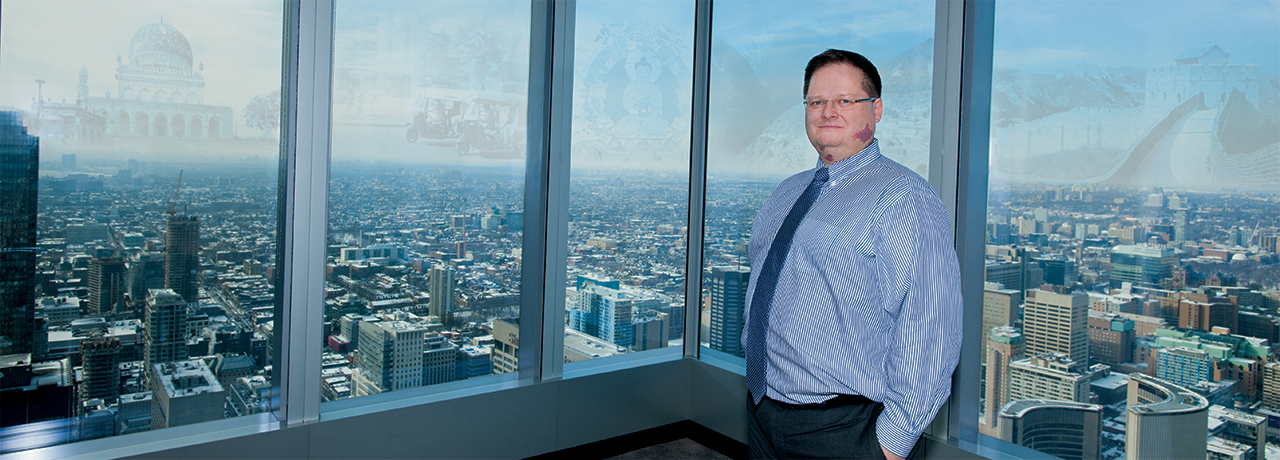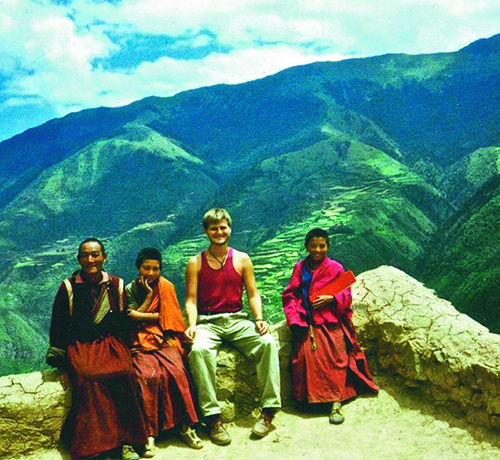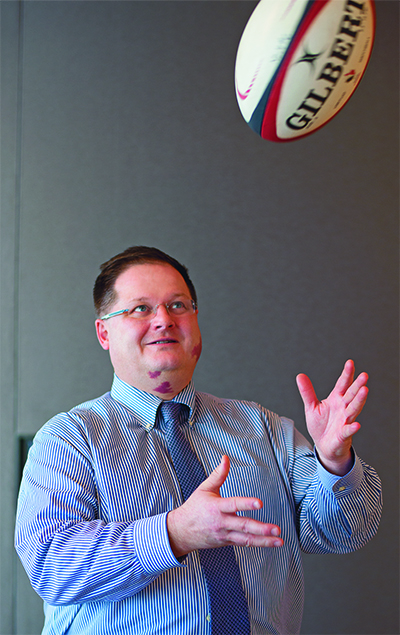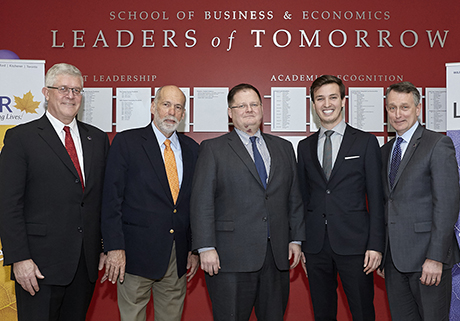
Photography by Dean Palmer
As the executive vice-president and chief investment officer of Gluskin Sheff + Associates, Bill Webb (BBA ’86) is part of a 140-person firm that oversees $8 billion in portfolios for high net-worth clients. One of Laurier’s strongest supporters, he and his wife, Dr. Agnes Wong, have contributed close to $1.3 million to the university, including gifts to the School of Business and Economics, the Laurier Centre for Economic Research & Policy Analysis, Laurier’s Co-op & Career Services, a BBA entrance scholarship, and a leadership-level gift of $1 million toward building the Global Innovation Exchange.
But Webb’s alumni leadership extends beyond his financial generosity. In recognition of the benefits he received as a Laurier business co-op student, Webb created an outstanding co-op program at Gluskin Sheff just three years after joining the firm. His comprehensive teaching approach has been a great success, and 135 Laurier students have since benefited from the program and his mentorship.
In an interview at the Gluskin Sheff offices, high up in one of Toronto’s tallest skyscrapers, Webb tells stories of leadership, teamwork and adventure, starting with his upcoming trip – an extraordinary adventure to one of the most forbidding places on the planet.
In January 2016, Webb will be flying to Antarctica with a team of 18 civilians and nine Canadian veterans to ascend Vinson Massif, the highest peak on the continent and one of the world’s Seven Summits. It’s a 21-day challenge to reach a mountain that stands 1,200 kilometres from the South Pole and rises upward for 4,890 metres.
The expedition is a high-profile effort by the True Patriot Love Foundation to raise critical funds and awareness for challenges faced by the men and women of the Canadian Armed Forces following their service. It will help ensure that our veterans will receive the care they need to recover and reclaim their body and spirit.
“I’m very glad to support this cause,” says Webb. “It’s a great new adventure and a chance to get myself back into the mountain shape I had in my younger days.”
He gained that mountain shape from a series of adventures that began just after graduating from Laurier with a BBA in 1986. After three successful co-op terms at IBM, Webb had a promising career opportunity from a Canadian consulting firm. It seemed he was on a clear-cut path for a successful career. But when he found out there would a two-month waiting period until the job was confirmed, Webb decided to jump on a plane and fly to London to visit a friend. He hoped to find an odd job or two to tide him over.
“I packed a suit, a tie and my rugby kit,” says Webb, an avid rugby player and coach. “I thought it would be a two-month vacation. I was gone four years.”
Early in the holiday, while wandering in a public library in London’s Chelsea district, Webb happened to read a small advertisement about a course in trading financial futures, mostly bonds and currencies. He hadn’t majored in Finance at Laurier and it was an expensive trading course. But a scholarship was available and he decided to tackle it. Soon after he started, he got the call that the job was waiting for him back home. “So, I had a choice to make – safe job in Canada or take a chance on something that might come out of the course? I was loving the course. We were having all kinds of fun. So, I took a deep breath and turned down the job in Canada.”
Four months later, Credit Suisse, the international investment bank, offered him a position. Webb had found a passion for finance, a clear career path, and an important mentor, Oswald Gruebel.
“1987 was a very volatile year in all financial markets,” says Webb. “Ossi was a man of few words, but he gave me significant responsibility in that volatile period. He showed trust in me. I learned fast, and I learned a lot from my mistakes, as you do in this business. It was a great way to learn. And I was making money. I thought I was rich. I wasn’t, but it felt like that.”
After a little more than a year, Webb began to think about taking time out of his budding career to see more of the world. When he explained his idea to Gruebel, Webb was offered more money to stay. “When I turned him down again, he said, ‘I can see you’re serious. Well, I think you’re doing the right thing. You’re young, go and see the world. If you run out of money, go into any one of our offices. If there’s a job available, I will be a reference for you.’ That’s the kind of support he offered me.”
 For the next year-and-a-half, Webb backpacked through Europe, the Middle East, China, India and Nepal. Finding himself on long train rides, he picked up a Berlitz phrase book and began to learn Mandarin Chinese. He started up conversations with people on the train. “I would teach them a bit of English and they would teach me a bit of Chinese,” he explains.
For the next year-and-a-half, Webb backpacked through Europe, the Middle East, China, India and Nepal. Finding himself on long train rides, he picked up a Berlitz phrase book and began to learn Mandarin Chinese. He started up conversations with people on the train. “I would teach them a bit of English and they would teach me a bit of Chinese,” he explains.
Eventually, the young traveller ended up in China. He was there during the Tiananmen Square tragedy, in a remote area in the Guangxi province. Later that summer, he was in western Sichuan province, in an area closed to foreigners. He was travelling to Mount Kailash, a sacred pilgrimage site in western Tibet. Although he dressed in local Tibetan clothes, he was discovered as a foreigner and arrested.
“They thought I was a spy, or possibly a journalist. I was detained in a remote logging village and interrogated for three days. They let me go, but first I had to write a ‘self-criticism’ – that’s like a confession – and pay a small fine.”
After that experience, Webb headed to Australia, where he thought he would return to Credit Suisse in the bank’s Sydney office. But then another advertisement caught his eye.
“An Indian gentleman was taking Aussies, Kiwis and Brits into the Himalayan range of northern Indian and Nepal. He needed someone to help guide them. They were trekking trips, sometimes with sherpas, for three or four weeks. He pulled out some maps and tested my knowledge of the region, and then gave me the job.”
The position offered only room and board, but Webb saw a chance to spend a year in a beautiful part of the world. “I still had no ties, no responsibilities, so I could do it,” he explains.
Webb continued his adventures until the fall of 1991, when he decided he wanted to formally study Mandarin Chinese. He found a program at McGill University that offered an MBA and a diploma in management, with a focus on East Asian studies.
“I typed out my application on a manual typewriter in Beijing. Because the BBA program at Laurier had been so comprehensive, I was given advanced placement in a number of the first-year courses. When I got to Montreál, I met Agnes, who would eventually become my wife.”
While his future wife began her medical residency in Toronto, Webb took on a one-year contract with the Bank Credit Analyst Research Group. Armed with his skill in the language and his understanding of East Asia, Webb became one of their first men on the ground in China. “At the time, the country was really opening up to foreign investors. I could sense it was going to be a massive economic force. You could see the enthusiasm for the kind of ‘quasi-capitalism’ that was emerging. And there was a lot development in financial markets and infrastructure. It was incredibly dynamic. It was a lot like the Wild West.”
When it became clear that his wife would develop her career in Toronto, Webb applied to Gluskin Sheff + Associates. It was a small firm at the time, but rising quickly. Gerald Sheff had been white-water rafting in Nepal and was drawn to Webb’s application because of his travel experience.
His travel time was again paying off in ways he could never have foreseen. “I think a lot of leaders are looking for multi-dimensional employees. I know I am. I look for employees that show a consistent pattern of achievement, in whatever they have committed themselves to.”
Noting the example of his own “non-linear” career development, Webb advises Laurier students to “try something different, to be willing to go down a blind alley, to just follow their passion and their instincts. Then your career will become something you love, not a chore to get through.”
 Webb loves his work. “It’s fascinating. The investment world requires you to pull from all kinds of knowledge. I’m analyzing the world from the lens of business strategy, finance, economics, politics, sociology, psychology – you name it. I’m very thankful for my broad education. You have to be aware of what’s happening all over the world. There’s so much to consider in every decision.
Webb loves his work. “It’s fascinating. The investment world requires you to pull from all kinds of knowledge. I’m analyzing the world from the lens of business strategy, finance, economics, politics, sociology, psychology – you name it. I’m very thankful for my broad education. You have to be aware of what’s happening all over the world. There’s so much to consider in every decision.
“Our team is responsible for the savings of people and organizations – for their pension funds and charities. We take that very seriously. I work hard but I love what I’m doing.”
Teamwork plays a huge part of Webb’s life, both at work and in his leisure time. He began playing rugby in high school and continued while at Laurier and overseas. He now coaches at the grassroots level and is on the Captain’s Council of the Toronto Inner-City Rugby Foundation, an organization committed to sharing the game and its values with young people in Toronto.
“Rugby is more than a sport; it’s a whole culture,” he explains. “At its core, there is a set of values that mean a lot to those of us who play. Teamwork, respect, enjoyment, discipline and sportsmanship – those are the values we play the game by. And try to live by.”
Trust and teamwork have played a big role at Gluskin Sheff, says Webb. The support, mentorship and opportunities provided by Ira Gluskin and Gerald Sheff made a huge difference in his development, he adds, and he has tried to carry that into the co-op program.
“I think teamwork and leadership are closely related. In whatever role you’re in, you have to take full responsibility for your part. If everyone is doing that, the team’s chances of success are much higher. To take that even further, I think a good leader is also a good team player. It’s important that everyone makes the effort to communicate effectively.
"Leaders need to show others why taking a particular action will be rewarding to them, and to their team. You have to help them see what’s possible and why something is in their self-interest. Then they are engaged and motivated. Then you’re really working together.”
Webb is delighted to learn that Laurier’s School of Business and Economics has once again taken the title of “School of the Year” at the Jeux de Commerce Central competition, for the sixth year in a row. “That’s teamwork,” he says, beaming.
“That’s what can happen. And I think it’s that spirit of teamwork and community that makes Laurier such a great university. The school is unique that way. I really believe that. It’s in the culture of the place – in the students, faculty, programs – you name it. The focus is on pulling together to accomplish something great. I love that. “If I had one piece of advice for Laurier students, just one, I’d say take this chance to learn to become a really proud and productive team member. Be part of a team that is in pursuit of a cause that is important to you. You’ll be much happier and successful in your life. You’ll be off to a great start of your own journey.”
Webb has a few words for his fellow alumni, as well.
“Laurier was my community when I was a student. I gained an excellent education, career opportunities and many friends from that experience. Laurier had a huge impact on my life. Now it’s within my circle of support.
“Being active with Laurier gives you a chance to expand your circle. You can engage in many ways. Homecoming is great – but it can be more than that. You can be a role model. You can give back financially. Or you can get involved in the activities at the school again. Just come back. See what appeals to you and decide where you can contribute.
“I’m on Team Laurier. Always will be.”
